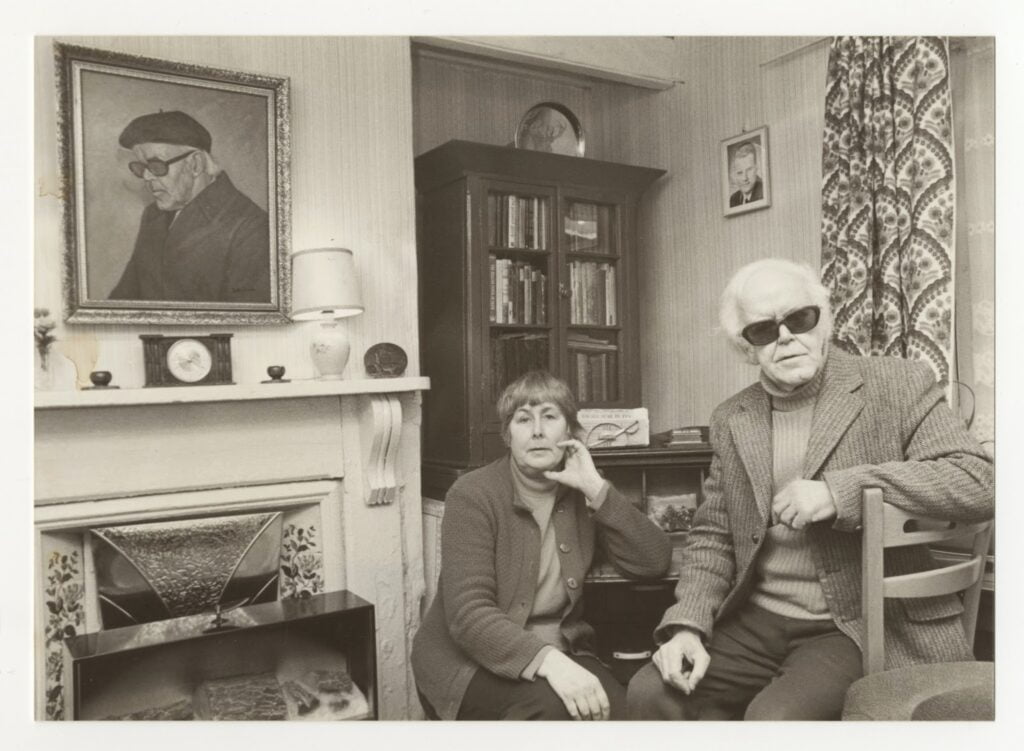On 25th July 1994, Cornwall mourned the death of its remarkable Cornish poet, Jack Clemo, who was once described as “the John Bunyan of the century”, and was crowned Prydyth an Pry (Poet of the Clay) at the 1970 Cornish Gorsedd festival.

Jack Clemo desperately wanted to be remembered for what he really was, and not the way he had been portrayed by some of his publishers as a hard-unfeeling character. I had the privilege of talking to Len Truran, the well-known local publisher who said,” I was proud to be approached to publish ‘The Bouncing Hills’ which was a book of Jack’s dialect stories for children, about children. At the time I was reading his first book ‘Wilding Graft’ and after reading his ‘Bouncing Hills’ the true image of Jack Clemo came over; the image of a man of warmth, grasping for understanding from his fellows.”
Born in 1916, at Goonamarris, Jack hardly knew his father who was killed in the First World War and was brought up in stark surroundings by his mother, beset by poverty as well as deafness and blindness. Disliked at school, he became a recluse and was determined to become a writer and was convinced that one day he would marry.
His first novel was published in 1948 and won the Atlantic Award in Literature from Birmingham University. Well known Cornish writer and critic, A.L. Rowse wrote: “He is of the spiritual progeny of that greatest of West Country writers, Thomas Hardy.”
Following a tender love affair conducted by mail, Jack Clemo married Ruth Peaty in 1968, and the happiness in his life is apparent in the mellow writing that followed which is in stark contrast to his early works. The extraordinary story of their marriage is told in his second autobiography, “Marriage of a Rebel”, and is also tenderly described in Sally Magnusson’s book “Clemo: A Love Story”.
Together with his widow, Ruth, Cornwall did mourn his sad loss.

JACK CLEMO 1916-1994
The Two Winds – In Memoriam Jack Clemo by John Hurst
You were born between tip and farm.
The tips’ geography spoke to an inner harshness
The wind-torn thorns, the straggling furze,
The mangled cross-beams were truer for you
Than the trite emblems of Faith
Primrose. the surge of birds, the nestling spire.
In the wind’s shrillness there spoke
A voice of God – though neither still nor small
Bracing not blasting.
And then the weather turned,
And milder breezes blew,
Caressing mind and senses to
The haven of Christian marriage
From which you journeyed together,
You and Ruth, To Dorset, Florence. Venice:
In your “Broad Autumn”
In your “Affirmative Way”.
Both winds were God’s.
N.B. Broad Autumn and Affirmative Way are titles of poems by Jack Clemo.
The Clay-Tip Worker by Jack Clemo
Our clay-dumps are converging on the land:
Each day a few more flowers are killed,
A few more mossy hollows filled
With gravel. Like a clutching hand
The refuse moves against the dower,
The flaunting pride and power
Of springtide beauty menacing the sod;
And it is joy to me
To lengthen thus a finger of God
That wars with Poetry. […]
I love to see the sand I tip
Muzzle the grass and burst the daisy heads.
I watch the hard waves lapping out to still
The soil’s rhythm for ever, and I thrill
With solitary song upon my lip,
Exulting as the refuse spreads:
“Praise god, the earth is maimed,
And there will be no daisies in that field
Next spring; it will not yield
A single bloom or grass blade: I shall see
In symbol potently
Christ’s Kingdom there restored:
One patch of Poetry reclaimed
By Dogma: one more triumph for our Lord.”
The Flooded Clay-Pit by Jack Clemo
These white crags
Cup waves that rub more greedily
Now half-way up the chasm; you see
Doomed foliage hang like rags;
The whole clay-belly sags.
What scenes far
Beneath those waters: chimney-pots
That used to smoke; brown rusty clots
Of wheels still oozing tar;
Lodge doors that rot ajar.
Those iron rails
Emerge like claws cut short on the dump,
Though once they bore the waggon’s thump:
Now only toads and snails
Creep round their loosened nails.
Those thin tips
Of massive pit-bed pillars – how
They strain to scab the pool’s face now,
Pressing like famished lips
Which dread the cold eclipse